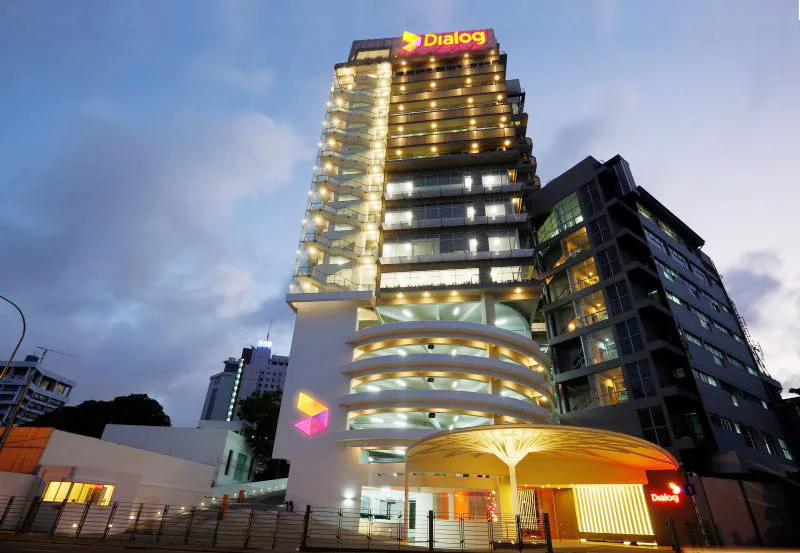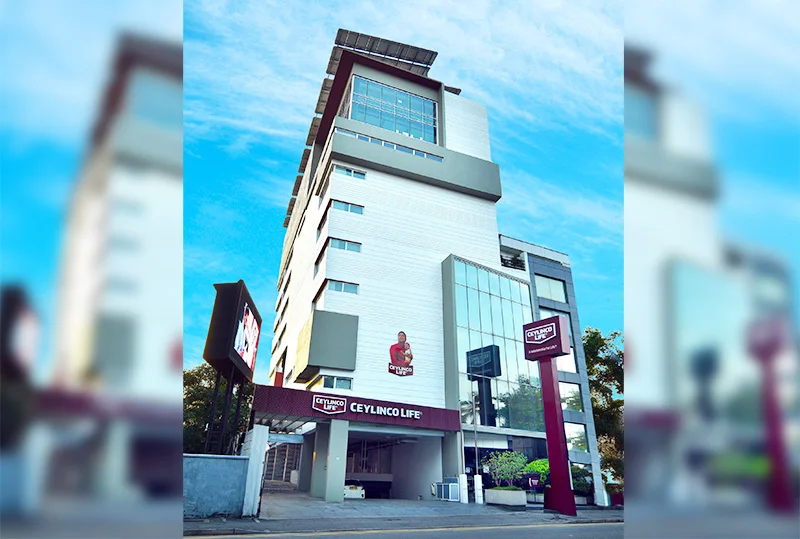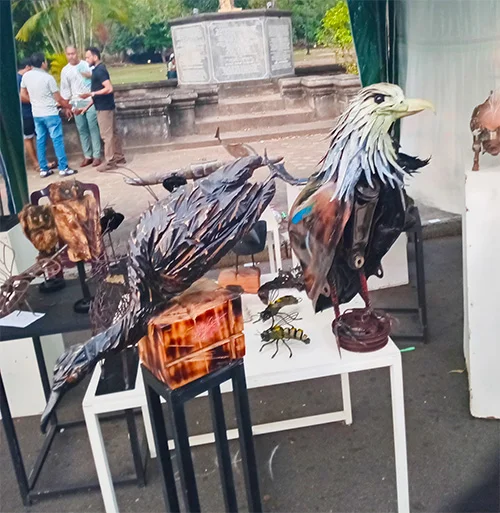Business
‘Serendib Flour Mills playing key role in Sri Lanka’s food security’

By Ifham Nizam
Serendib Flour Mills (SFML), a wholly-owned subsidiary of Dubai-headquartered Al Ghurair, one of the leading diversified family businesses in the United Arab Emirates (UAE), recently conducted a media tour of its state-of-the-art facility situated at the Colombo Port.
This visit underscored SFML’s ongoing commitment to enhancing Sri Lanka’s food security, fostering innovation, and promoting sustainable practices within the flour manufacturing industry.
For the past 15 years, SFML has stood as a trusted cornerstone of Sri Lanka’s food industry, propelled by the overarching purpose of ‘Nourishing the Nation.’ The company’s dedication to excellence is manifest in its utilization of pioneering Swiss Buhler technology, enabling the delivery of the highest quality flour and the introduction of groundbreaking innovations to the Sri Lankan market.
Currently, the company’s diverse portfolio features over 20 flour varieties, catering to a broad spectrum of clientele, ranging from artisan bakers to large-scale manufacturers and households. Recent additions include the Premium Flour line for superior bakery products, Adi Shakthi Fortified flour for plantation communities, and Fibre Plus to combat non-communicable diseases. These value-added offerings significantly enhance Sri Lanka’s food ecosystem and contribute to fostering a healthier nation.
SFML’s operations are meticulously designed to prioritize sustainability and environmental protection. The company employs tanker silo operations for larger industrial customers, thereby reducing energy consumption, labor requirements, and landfill waste, thereby making a substantial contribution towards environmental sustainability.
Committed to upholding food security in Sri Lanka, SFML maintains a three-month buffer of wheat stocks at all times, ensuring a consistent supply throughout the year. With five company-managed warehouses strategically positioned across the country, SFML ensures easy access to its products nationwide.
Vijay Sharma, CEO of Serendib Flour Mills, said; “At Serendib Flour Mills, we are committed to nourishing lives across Sri Lanka through sustainable and innovative food solutions. By harnessing the power of modern technology and upholding the highest standards of corporate citizenship, we aspire to be the trusted partner in ensuring food security for our nation.”
SFML extends its dedication beyond flour production through impactful social responsibility initiatives. The ‘Serendib Uthama Dalada’ program offers senior citizens from Elders Homes the opportunity to witness the Esala Perahera. Additionally, the ‘7 Star Manusathkara’ program empowers marginalized and vulnerable communities, showcasing SFML’s commitment to social upliftment.
SFML consistently underscores the importance of consuming domestically produced branded flour as the safest option for consumers. The company’s unwavering adherence to the highest quality standards and stringent control measures ensures nutritious offerings for all Sri Lankans through the finest wheat flour
SFML Director Brand & Corporate Communications, Kalinga Wijesekera responded to The Island Financial Review:
What initiatives has Serendib Flour Mills undertaken to contribute to food security in Sri Lanka? How successful are you?
During the economic crisis in SL there were many shortages of essential items such as fuel, gas and other food items. However, there were no queues for flour or bread because we were able to supply without an interruption. At any given time we store a minimum of three months of grains in our silos and another two months of grain requirement is on order at all times. We manage 5 warehouses across the country. At any given time these warehouses carry 30% of the monthly requirement of flour at any given time. As a result we are able to swiftly deliver to any market within a short time span. These measures have helped us to positively contribute to the food security of the country.
How has SFML diversified its product offerings in the wheat flour market since its establishment in 2008?
When Serendib entered the market in 2008 there were only one or two flour types/products. We were the first to segment the market and come out with different flour types to suit each segment. Example; Bakers flour for the bakery Industry, Rotti flour for the eateries, Household flour for domestic households and similarly Noodle flour, Biscuit flour, Cake flour, Whole meal flour etc. etc. . Today we offer 20+ varieties of flour to our customers.
Can you describe SFML’s role and its impact on the bakery industry?
We consider the bakery Industry as a very vital industry and work very closely with the All Ceylon Bakery Owners Association. We have regular meetings with its chairman and the committee to understand what is required and supports them in various endeavors. We have Bakers flour in 25Kg and 50Kg, especially designed for the bakery Industry. It’s ideal for making of bread and other bakery products. Recently we launched Premium Bakery flour for those bakeries looking for a superior product. Premium flour provides whither and a softer bread which is also tastes better. Because of the higher gluten wheat it gives a better yield i.e. more loafs of bread. All in all Premium flour gives a superior loaf of Bread.
In addition we also have a technical team providing technical assistance to the bakers, new product development, new recipe development, trouble shooting, costing and pricing etc. on FOC basis 24/7.
What is the significance of the fortified flour product ‘Serendib Adi Shakthi’ in addressing dietary issues among the plantation communities in Sri Lanka?
According to WHO and the Ministry of Health 1 in every 3 school going children is suffering from anemia in the country. This is more prevalent among the tea plantation communities as a result of a lack of a balanced diet. According to research, lack of Folate in pregnant women contributes to certain defects in the new born. SFML along with the Plantation Human Development Trust (PHDT), after many rounds of discussions, came up with this concept of providing a fortified flour, i.e. fortified with Iron, Folic acid and Vitamin B12 to address these dietary issues of the tea plantation communities. Wheat flour, being one of the main sources of nutrition of the plantation communities, this was the ideal way of addressing their anaemic conditions and folate deficiencies. ‘Adi Shakthi’- fortified flour was crafted and distributed exclusively to the tea plantations.
How does SFML’s new wheat flour product, ‘7 Star Fibre Plus’, aim to combat non-communicable diseases (NCDs) prevalent in Sri Lanka?
According to statistics in SL over 25% adults are overweight, while 9.2% are obese. NCDs kill 41m people, i.e. to 71% of all deaths globally, while in SL it is 83%. Life styles of people are the major contributor to this situation. Recognizing this factor SFML launched ‘7 Star Fibre Plus’ to address these issues. Dietary fibre is found in wheat grain. ‘7 Star Fibre Plus’ is enriched with fibre, providing 10% of your daily fibre needs. According to research, Individuals with high intakes of dietary fibre appear to be at significantly lower risk for developing NCDs. Increasing fibre intake lowers blood pressure and serum cholesterol levels.
Could you elaborate on SFML’s initiatives towards community welfare, particularly during times of crisis, such as the COVID-19 pandemic and natural disasters?
Serendib undertook the initiative to facilitate elderly people to witness the annual Kandy Dalada Perahera. Titled ‘Serendib Uthama Dalada 2023’, Serendib organized elderly people from over four elders homes located in Central and Northwestern Provinces to witness the majestic event. SFML ensured all facilities, such as, transport, food and seating arrangements were provided to these elders to witness the Perahera in comfort.
Similarly, during the height of Covid, Serendib embarked on a journey to supply wheat flour to over 1,000 families in the Chilaw district at a time when the curfew was in place and people were deprived of their daily incomes. The program was titled ‘7 Star Manusathkara’, aimed to nourish the vulnerable sections of society.
On the same lines over 2,500 flood- affected families in Kinniya and Kalmunai areas were provided with their wheat flour requirements during the recent floods in these regions earlier this year.
What environmental sustainability measures has SFML implemented in its operations, particularly regarding packaging and transportation?
Serendib delivers wheat flour in bulk tankers and stored in silos to its key its customers. The initiative resulted in the reduction of land fill as no PP bags were used to pack flour and less energy and storage space was used, thus contributing to environmental sustainability.
Business
Dialog delivers strong growth, stronger national contribution in FY 2025

Dialog Axiata PLC announced, Friday 6th February 2026, its consolidated financial results (Reviewed) for the year ended 31st December 2025. Financial results included those of Dialog Axiata PLC (the “Company”) and of the Dialog Axiata Group (the “Group”).
Group Performance
The Group delivered a strong performance across Mobile, Fixed Line and Digital Pay Television businesses recording a positive Core Revenue growth of 16% Year to Date (“YTD”). Group Headline Revenue reached Rs179.6Bn, up 5% YTD, despite the continued strategic scaling down of low-margin international wholesale business. In Q4 2025, Revenue was recorded at Rs46.5Bn up 2% Quarter-on-Quarter (“QoQ”) and 2% Year-on-Year (“YoY”).
The Group Earnings Before Interest, Tax, Depreciation and Amortisation (“EBITDA”) reached Rs86.0Bn up 30% YTD supported by Core Revenue performance and Cost Rescaling Initiatives. On a QoQ basis Group EBITDA demonstrated a modest growth to record at Rs23.0Bn up 2% QoQ with an EBITDA margin of 49.5% in line with the Revenue performance. Group EBITDA margin reached 47.9% for FY 2025, up 9.2pp.
Group Net Profit After Tax (“NPAT”) reached Rs20.8Bn for FY 2025, up 67% YTD mainly resulting from robust EBITDA growth, despite higher tax and net finance costs. Normalized for forex impact, NPAT growth was recorded at +>100% YTD to reach Rs22.1Bn. On a QoQ basis NPAT grew 3% to reach Rs5.9Bn resulting from strong EBITDA performance.
On the back of strong operational performance, the Group recorded Operating Free Cash Flow (“OFCF”)
of Rs49.3Bn for FY 2025 up >100% YTD.
Dividend Payment to Shareholders
In line with the dividend policy and financial performance of the Group and taking into account the forward investment requirements to serve the nation’s demand for Broadband and Digital services, the Board of Directors of Dialog Axiata PLC at its meeting held on 6th February 2026, resolved to propose for consideration by the Shareholders of the Company, a dividend to ordinary shareholders amounting to Rs1.50 per share. The said dividend, if approved by shareholders, would translate to a Dividend Yield of 5.0% based on share closing price for FY 2025. The dividend so proposed will be considered for approval by the shareholders at the Annual General Meeting (AGM) of the Company, the date pertaining to which would be notified in due course.
Company and Subsidiary Performance
At an entity level, Dialog Axiata PLC (the “Company”) continued to be the primary contributor to Group Revenue (76%) and Group EBITDA (74%). Aided by sustained growth in the Data segment and cost-rescaling initiatives, Company revenue was recorded at Rs135.8Bn for FY 2025, up 18% YTD, EBITDA rose 32% YTD to reach Rs63.6Bn. On a QoQ basis, Q4 2025 Revenue was recorded at Rs34.8Bn, down 1% QoQ due to a reclassification of Hubbing Revenue, while EBITDA decline 1% QoQ to record Rs17.0Bn, largely attributable to network restoration costs and donations made in relation to the Cyclone Ditwah relief efforts. Furthermore, NPAT was recorded at Rs15.6Bn for FY 2025, up 41% YTD. Normalised for forex impacts, the company NPAT was up +>100% YTD to reach Rs17.0Bn. On a QoQ basis, Company NPAT was recorded at Rs4.5Bn, down 6% QoQ.
Business
Ceylinco Life’s Pranama Scholarships reach 25-year milestone

Ceylinco Life has announced the launch of the 25th consecutive edition of its flagship Pranama Scholarships programme, marking a significant milestone in the company’s long-standing commitment to recognising and rewarding excellence among the children of its policyholders.
Under the 2026 programme, the life insurance market leader will present scholarships with a total cumulative value of Rs. 22.7 million, continuing a rewards initiative that has now been conducted without interruption for a quarter of a century. Since its inception, the Ceylinco Life Pranama Scholarships programme has benefitted 3,466 students across the country, representing a total investment of Rs. 240 million in nurturing academic achievement and outstanding performance in sports, arts and other extracurricular pursuits.
Business
Sri Lankans’ artistic genius glowingly manifests at Kala Pola ‘26

The artistic genius of Sri Lankans was amply manifest all over again at ‘Kala Pola ‘26’ which was held on February 8th at Ananda Coomaraswamy Mawatha Colombo 7; the usual, teeming and colourful venue for this annual grand exhibition and celebration of the work of local visual artists.
If there is one thing that has flourished memorably and resplendently in Sri Lanka over the centuries it is the artistic capability or genius of its people. It is something that all Sri Lankans could feel a sense of elation over because from the viewpoint of the arts, Sri Lanka is second to no other nation. With regard to the visual arts a veritable dazzling radiance of this inborn and persisting capability is seen at the annual open air ‘Kala Pola’.

A bird of Sri Lanka created from scraps of iron waste.
All capable visual artists, wherever they hail from in Sri Lanka, enjoy the opportunity of exhibiting their work at the ‘Kala Pola’ and this is a distinctive ‘positive’ of this annual event that draws numberless artists and viewers. There was an abundance of paintings, sketches and sculptures, for instance, and one work was as good as the other. Ample and equal space was afforded each artist. Its widely participatory and open nature enables one to describe the exhibition as exuding a profoundly democratic ethos.
Accordingly, this time around at ‘Kala Pola ‘26’ too Sri Lankans’ creative efforts were there to be viewed, studied and enjoyed in the customary carnival atmosphere where connoisseurs, local and foreign, met in a sprit of camaraderie and good cheer. Many thanks are owed once again to the George Keyt Foundation for the presentation of the event in association with the John Keells Group and the John Keells Foundation, not forgetting the Nations Trust Bank, which was the event’s Official Banking Partner. The exhibition was officially declared open by Chief Guest Marc-Andre Franche, UN Resident Coordinator in Sri Lanka.
By Lynn Ockersz
-

 Features3 days ago
Features3 days agoMy experience in turning around the Merchant Bank of Sri Lanka (MBSL) – Episode 3
-

 Business4 days ago
Business4 days agoZone24x7 enters 2026 with strong momentum, reinforcing its role as an enterprise AI and automation partner
-

 Business3 days ago
Business3 days agoRemotely conducted Business Forum in Paris attracts reputed French companies
-

 Business3 days ago
Business3 days agoFour runs, a thousand dreams: How a small-town school bowled its way into the record books
-

 Business3 days ago
Business3 days agoComBank and Hayleys Mobility redefine sustainable mobility with flexible leasing solutions
-

 Business4 days ago
Business4 days agoHNB recognized among Top 10 Best Employers of 2025 at the EFC National Best Employer Awards
-

 Business4 days ago
Business4 days agoGREAT 2025–2030: Sri Lanka’s Green ambition meets a grid reality check
-

 Editorial6 days ago
Editorial6 days agoAll’s not well that ends well?













